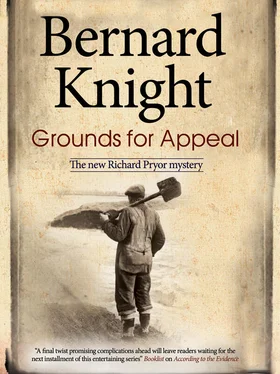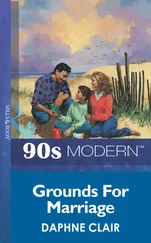Bernard Knight - Grounds for Appeal
Здесь есть возможность читать онлайн «Bernard Knight - Grounds for Appeal» весь текст электронной книги совершенно бесплатно (целиком полную версию без сокращений). В некоторых случаях можно слушать аудио, скачать через торрент в формате fb2 и присутствует краткое содержание. Жанр: Классический детектив, на английском языке. Описание произведения, (предисловие) а так же отзывы посетителей доступны на портале библиотеки ЛибКат.
- Название:Grounds for Appeal
- Автор:
- Жанр:
- Год:неизвестен
- ISBN:нет данных
- Рейтинг книги:4 / 5. Голосов: 1
-
Избранное:Добавить в избранное
- Отзывы:
-
Ваша оценка:
- 80
- 1
- 2
- 3
- 4
- 5
Grounds for Appeal: краткое содержание, описание и аннотация
Предлагаем к чтению аннотацию, описание, краткое содержание или предисловие (зависит от того, что написал сам автор книги «Grounds for Appeal»). Если вы не нашли необходимую информацию о книге — напишите в комментариях, мы постараемся отыскать её.
Grounds for Appeal — читать онлайн бесплатно полную книгу (весь текст) целиком
Ниже представлен текст книги, разбитый по страницам. Система сохранения места последней прочитанной страницы, позволяет с удобством читать онлайн бесплатно книгу «Grounds for Appeal», без необходимости каждый раз заново искать на чём Вы остановились. Поставьте закладку, и сможете в любой момент перейти на страницу, на которой закончили чтение.
Интервал:
Закладка:
He was wrong, but it would be some time before this became apparent.
Richard did two post-mortems at the dingy mortuary in the council yard at Chepstow, before going on to Bristol.
One was a sudden death from coronary heart disease, the other more unusual, in that it was a fatal accident on a farm near Caldicot. Farms were dangerous places, mainly due to overturned tractors and falls from barns and hayricks, but this was unusual in that a worker had crawled into the outlet of a grain silo to clear a blockage, when tons of barley had suddenly fallen and suffocated him. Richard drove pensively the couple of miles to the ferry ramp at Beachley, thinking of how death could descend so abruptly even on a peaceful farm, just as harshly as on a battlefield. He never allowed such tragedies that he saw virtually every day to weigh too heavily on his mind, otherwise he would be unable to function. However, he tried to avoid the brashness of some of his colleagues who treated corpses with a boisterous nonchalance that he felt was an overreaction to a gruesome profession. Richard had noticed the same attitude in some mortuary attendants, policemen and even undertakers, who tended to refer to ‘stiffs’ and ‘meat wagons’, and talk and laugh with nervous exuberance to compensate for the macabre surroundings.
His pensive mood was lightened by the short voyage across the swirling stretch of the River Severn to Aust, the scenery bright in the mid-morning air, now that last night’s rain had stopped. By contrast, as he drove the last few miles into Bristol, he saw again the rapid building activity that was both extending the city’s limits and restoring the gaps left by the extensive wartime bomb damage. Some of the new structures were ugly, unimaginative boxes, thrown up quickly and cheaply from designs apparently created by architects who could only draw rectangles with their pencil and ruler.
Richard’s destination was St Paul’s, an old run-down residential area to the north of the city centre. Last evening’s study of a map in his AA road atlas had given him a general idea of where he was headed and a final enquiry through his driver’s window of a Jamaican lady pushing a pram, directed him to Grosvenor Road.
Cruising along a row of shops gave him the street numbers and he soon spotted the names of the solicitors in gold paint on the windows above a building-society office. Finding a parking space a few yards further on, he locked the Humber and walked back to a door alongside the shop, where a brass plate declared it to be Middleton, Bailey and Bailey.
The narrow stairs took him to a small reception office, where a cheerful middle-aged woman took him along a corridor to a door which predictably had ‘D.G. Bailey LLB’ written on it.
Douglas Bailey was unlike many of the rather desiccated, elderly lawyers that Richard had met in market towns in Wales and the West Country. He was what his father might have termed a ‘city slicker’, a slim man of about forty in a blue pinstripe suit which Richard suspected had shoulder pads. His dark hair was Brylcreemed flat on his head and he had a small Errol Flynn moustache.
However, in spite of this unpromising appearance, Bailey proved to be well spoken, well informed and very much ‘on the ball’.
After the usual courtesies and a cup of tea provided by the matronly secretary, they sat each side of a cluttered desk and got down to business.
‘I’ll just give you an outline of the problem, Doctor Pryor, then let you take the file away to study at your convenience. If then you feel you can assist us, we’ll meet again with Counsel to discuss the details.’
When Richard nodded his assent, Douglas Bailey leaned forward on his elbows to tell his tale.
‘Our client is a woman, Millicent Wilson, though she went under the surname of her late partner, Arthur Shaw. I say “late”, as he’s the one who she was convicted of killing.’
‘I presume when you say “partner”, you mean it in the conjugal sense, rather than a business partner?’ asked Richard, thinking of his own relationship with Angela Bray.
‘Indeed I do. They lived here in St Paul’s — just down the road, in fact — but were not married. She is twenty-seven; he was thirty-nine at the time of his death. They lived in an old terrace house which was divided into a number of flats, though that’s a rather grand description for a scruffy collection of rented rooms and bedsits with a communal bathroom and kitchen.’
He gently diverged a finger and thumb across his moustache, as if encouraging it to grow a little more.
‘Not to put too fine a point on it, this household was hardly genteel or sophisticated. A couple of the occupants, including Arthur Shaw, were well known to the police and some had done time in prison, mostly for theft, assault and general petty crime.’
‘Did that apply to your client as well?’ asked Richard.
‘She certainly had no convictions, but she may have worked the streets at one time, though not recently. Anyway, this charming character Arthur Shaw used to knock her about regularly, usually when drunk, which again is not all that uncommon in this part of Bristol.’
He paused to drink down the rest of his cup of tea.
‘As I said, I won’t go into the details until you’ve read the papers, but in essence, Shaw had knocked her about a bit one evening, then she had gone with a friend to the cinema. He was at home, playing poker with some of the other men in the house. After she came home at about eleven thirty, sounds of a heated quarrel were heard from their rooms upstairs, but that was nothing unusual. She is seen to run out about midnight with a fresh black eye and cut lip, and goes to stay with her sister in the next street. In the morning, Arthur Shaw is found dead in their bedroom with a knife wound in his chest and a kitchen knife on the floor.’
Bailey handed the file across the desk to Richard Pryor.
‘She denied killing him, but the prosecution medical evidence claimed that the time of death corresponded to her return to the house. The knife had her fingerprints on it, amongst others, though that meant very little as it was from the communal kitchen. But there were spots of his blood on her sleeve, though she maintained that it got there earlier when she had hit him on the nose with a milk bottle when he was assaulting her.’
Richard tucked the file into his briefcase alongside his chair. ‘So she was convicted on mainly circumstantial evidence?’
‘Yes, convicted of murder, though the defence tried getting a manslaughter verdict. Not that it’s made that much difference, as the judge didn’t hand down a death sentence, but commuted it to life imprisonment. I think that was mainly because of all this current political discussion about abolition, though the defence tried to claim that it was because of their mitigation plea of severe provocation by an abusive partner.’
Bailey sniffed to convey his opinion of the previous defence team.
‘I have to say that their efforts were not all that energetic. That’s why Millie Wilson changed solicitors for this Appeal. I hope we can do a better job for her, though trying to get the Court of Criminal Appeal to overrule one of their precious judges is an uphill struggle. Often, they even refuse to hear new evidence.’
Richard tapped the side of his briefcase containing the file. ‘I gather the main issue as far as I’m concerned is the time of death?’
‘Yes, she’s got a cast-iron alibi when she was in the cinema and another when she got back to her sister’s place. It’s the half-hour interval in between that’s the problem.’
He gave his moustache another few encouraging strokes.
‘Also, if there’s any mileage in disputing these blood stains, that would be useful.’
Читать дальшеИнтервал:
Закладка:
Похожие книги на «Grounds for Appeal»
Представляем Вашему вниманию похожие книги на «Grounds for Appeal» списком для выбора. Мы отобрали схожую по названию и смыслу литературу в надежде предоставить читателям больше вариантов отыскать новые, интересные, ещё непрочитанные произведения.
Обсуждение, отзывы о книге «Grounds for Appeal» и просто собственные мнения читателей. Оставьте ваши комментарии, напишите, что Вы думаете о произведении, его смысле или главных героях. Укажите что конкретно понравилось, а что нет, и почему Вы так считаете.












